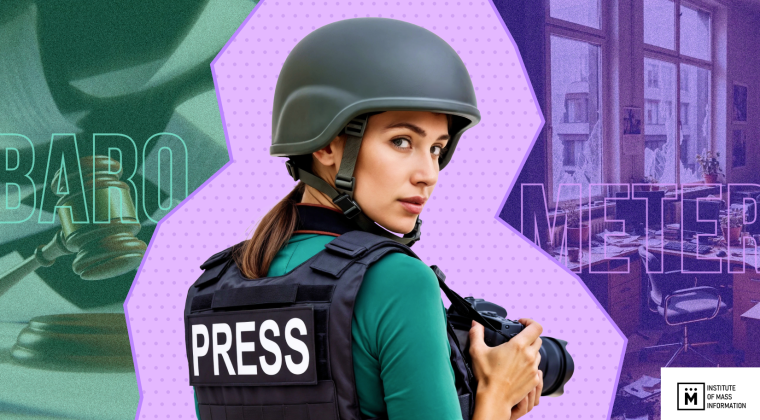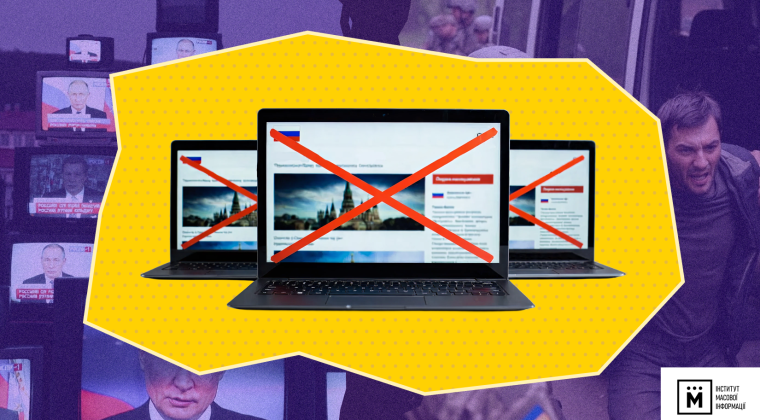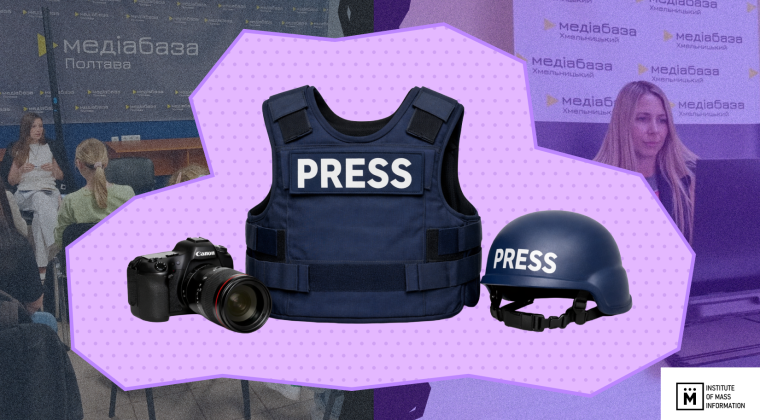In October, Russia carried out three of its most massive strikes on Ukraine, which, according to President Volodymyr Zelensky, resulted in 40% of Ukraine’s energy infrastructure being damaged. The country saw prolonged blackouts across the territory; many Ukrainian households faced water supply and heating problems.
IMI studied how Russian news websites were covering the October 10, 17, and 31 attacks on Ukraine. It turned out that Russian propaganda payed most attention to the first of these mass strikes. Russian media feeds were filled with news about each hit; the outlets were quoting every Ukrainian official’s statement about the damage done to the power supply facilities, posting photos and videos of the shelling’s aftermath, sharing eulogies and triumphant comments from Russian officials, experts, and propagandists. However, each subsequent time, such posts would become fewer and fewer.
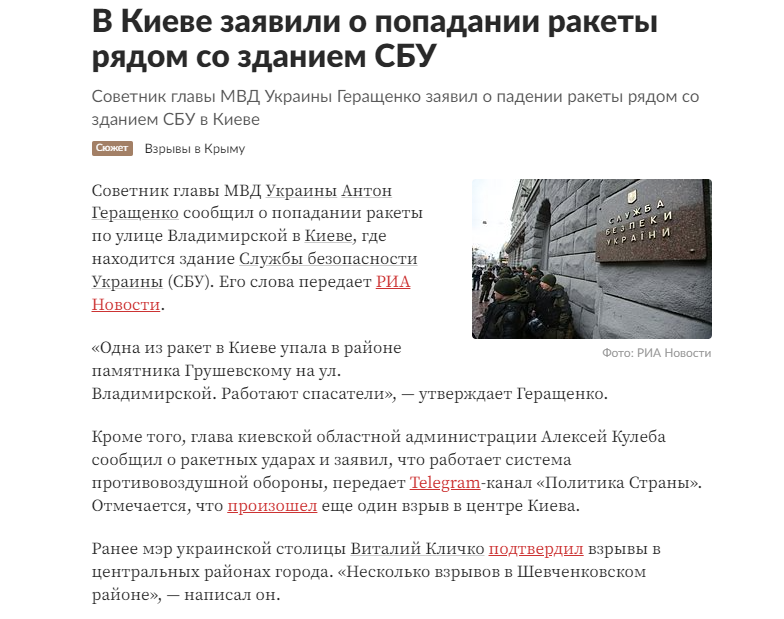
Screenshot: news article quoting advisor to the head of the Ukrainian MIA Anton Herashchenko, head of Kyiv Oblast Administration Oleksiy Kuleba, and Kyiv Mayor Vitaliy Klychko reporting damage on Volodymyrska St., the work of the air defense system, and several explosions in Shevchenkivsky district.
Russian propaganda was primarily trying to assign at least some military sense to the terror attack targeting the civilian population. However, to achieve this, pro-Kremlin publications were employing a kind of paradox logic. On the one hand, the propagandists were constantly emphasizing that the strikes were pinpoint, highly accurate, and hit targets that affect Ukraine’s military capabilities; on the other hand, they were incessantly gloating at the welfare problems the strikes created for residents of the peaceful areas. The media was approving of the strikes, urged the authorities to shell Ukraine like this for as long and as much as possible in order to “bomb it into the Stone Age” and leave it without light or heat in winter. According to Russian propagandists, this was supposed to break the Ukrainians, turn them against their government and drive them to surrender.
Moreover, by quoting Russian ruling elite, propagandists were painting the massive strikes on Ukraine’s peaceful cities as just. Since the October 10 attack came two days after the explosion on the Crimean Bridge, that event was portrayed as the reason for the multimissile attacks. That is, it was about justifying taking revenge on the civilian population for the damage done to a legitimate military target, responsibility for which the Ukrainian authorities did not even admit.
This pseudo-logical construct was based on the statement uttered by Russian President Vladimir Putin on October 10, 2022. All the propaganda resources we studied quoted it. So did the so-called “liberal” Russian media, and, much like the pro-Kremlin publications, they saw no need to supplement those posts with at least a mention of the fact that Ukraine did not admit responsibility for the attack on the Crimean Bridge.
“Komsomolskaya Pravda”: “Putin warns Ukraine of new strikes if Kyiv does not stop its terrorist attacks: key points from the October 10, 2022 speech.”
“Moskovsky Komsomolets”: “Putin explains Russia’s missile strikes on Ukrainian cities.”
RIA Novosti: “Putin talks about striking Ukraine’s military command sites.”
TASS: “Putin warns Kyiv of a tough response in case Ukraine keeps on with the terror attacks.”
“Vesti.ru”: “Putin announces the goals of the mass strike on Ukraine.”
RT: “Putin announces a mass attack on Ukraine’s infrastructure.”
“Gazeta.ru”: “Putin announces an attack on infrastructure and military headquarters in Ukraine.”
“Rossiyskaya Gazeta”: “Putin warns Kyiv of a tough response in case of further terrorist attacks on Russian territory.”
“Lenta.ru”: “Putin announces mass high-precision strikes on Ukrainian sites.”
“Izvestia”: “Putin announces plans to strike Ukrainian infrastructure.”
“Novaya Gazeta. Europe”: “Putin: A mass high-precision attack on Ukraine’s power supply, military command, and telecom facilities has been carried out.”
Only Meduza stood out in this regard, as their headline did emphasize that it is civilians who are suffering from the strikes: “‘A mass high-precision strike has been carried out,’ says Putin about the shelling of Ukrainian cities, which killed civilians.”
Unsurprisingly, all of these reports include the following quote from Putin’s speech:
“At the proposal of the Ministry of Defense and according to the plan of the General Staff of Russia, a massive strike on Ukraine’s power supply, military command, and telecom facilities has been carried out with high-precision long-range air, sea, and land-based weapons.”
All the aforementioned publications except “Novaya Gazeta. Europe” also quoted the Deputy Chairman of Russia’s Security Council, Dmitry Medvedev, citing his Telegram:
“The one to commission and commit the crime is the state that wasn’t – Ukraine;”
“In my opinion, our the goal of our future actions should be the complete dismantling of Ukraine’s political regime;”
“The first episode is over. More to come.”
The list of monotonous quotes posted by Russian propaganda publications on October 10 includes Ramzan Kadyrov’s Telegram comment saying that he is now “100% satisfied” with the course of the so-called “special military operation.”
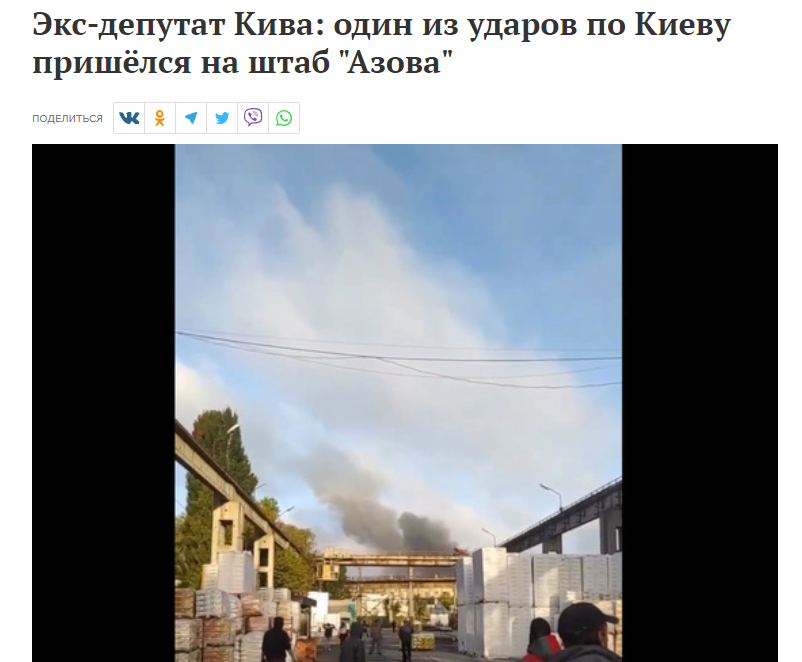
Headline: “Ex-deputy Kiva: one of the strikes on Kyiv hit the “Azov” headquarters”
Trying to come up with some military sense to assign to the mass missile attack on Ukraine, the propagandists also reported that one of the strikes allegedly hit “the headquarters of the Azov Regiment.” RIA Novosti, “Gazeta.ru”, “Vesti”, “Lenta.ru”, “Moskovsky Komsomolets”, and “Rossiyskaya Gazeta” wrote about this. Their source was a post in the Telegram channel run by a former Verkhovna Rada deputy who is currently hiding in Russia, Ilya Kiva.
RIA Novosti, RT, “Gazeta.ru”, “Lenta.ru”, and “Izvestia” relayed the statement of the Russian-appointed head of Crimea Sergey Aksyonov.
“The morning starts with good news: the approach to conducting the special military operation has changed… I hope that the pace of the operation will not slow down from now on,” he wrote on Telegram.
“I hope that this will not be a one-time occasion. We should continue. The strategy chosen for this morning is the right one. If we keep it up, everything will be over quickly,” Aksyonov said later on the propaganda program “Soloviev Live”.
“Izvestia”, as well as TASS, quoted the leader of the “DPR” group, Denis Pushylin, who commented on the mass missile attack on Ukraine on Telegram: “We saw a real and reasonable response. Or the beginning of such responses – as today – to these terrorist actions. Of course, this should affect the situation on the front line in general.”
RT, RIA Novosti and “Lenta.ru” cite a “doctor in military science”, as the publication calls him – Konstantin Sivkov, who believes that the mass attack on Ukraine’s energy infrastructure was only intended to demonstrate “that we are able to deliver such massive missile strikes and have the determination to do so.”
Along with quoting all kinds of public figures in each and every publication, propagandists were also working on creating more original posts designed to justify the mass strikes on civilian targets in Ukraine and call for more of them.
“Moskovsky Komsomolets”
The rhetoric of this propaganda resource was particularly cynical. It recounted RT editor-in-chief Margarita Simonyan’s Telegram post about the mass missile strike on Ukraine:
“Here comes the response,” wrote Simonyan.
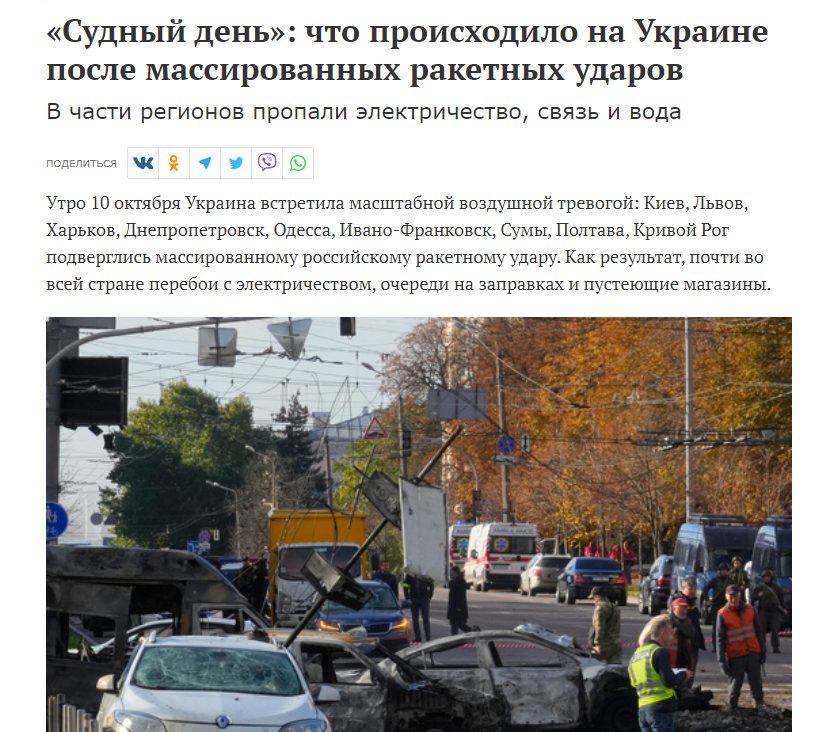
Headline: “Doomsday: What was happening in Ukraine following the mass missile strikes”
Moreover, one of the articles, signed by Viktor Zhdanov and Vladimir Mikhailov (the publication’s correspondents, apparently), speaks about the timeline of the attack and is titled “Doomsday: What was happening in Ukraine following the mass missile strikes”. The article claims that the attack caused panic in Ukrainian cities: “queues at gas stations and empty shops.”
In another text, Vladimir Mikhailov again writes that the rocket attack triggered a panic in Kyiv and that the citizens are in a state of shock. The article’s headline is as follows: “Kyiv residents start stocking food and preparing for livin in cellars.”
In his next opus, Viktor Zhdanov explains the logic behind the choice of targets for the missile strikes. According to his claims, the goal was to chose targets whose destruction “is likely to cause panic and destabilize the situation inside Ukraine.” “The people understand that there may be new strikes. And what if it is -30 °C outside? Many families will find themselves on the brink of survival, freezing without heating in their apartments,” writes the “Moskovsky Komsomolets” correspondent.
The propagandists also found it appropriate to look for targets for future attacks. For this purpose, the head of the Interregional Trade Union of Railway Workers of Russia, Yevgeniy Kulikov, is given the floor. He suggests shelling the railway tunnel in the Carpathians, because, according to him, “NATO weapons are being supplied to Ukraine through it.”
“Komsomolskaya Pravda”
Cynicism seems to be a trait especially characteristic of the “Komsomol” media’s correspondents.
For instance, Ivan Grachov came up with the following headline for his report: “Doomsday for Kyiv: what the Russian revenge strike on Ukraine’s critical infrastructure will change.” The article is also subtitled “Moscow finally dares to strike not with a knight’s epee, but with the bear’s whole paw. What comes next?”
The author claims that “Moscow had been trying to poke at the Banderite anthill with a knight’s epee: God forbid even one person not involved in the Nazi battalions and the regime suffers.”
He writes about taking revenge against the Ukrainians for the explosion on the Crimean Bridge, and also mentions the post stamp with the burning bridge and a banner depicting this stamp in downtown Kyiv.
According to Grachov, the missiles flying over Kyiv, Kharkiv, Lviv, Odesa, and Krivy Rih “were pinpoint strikes knocking out the infrastructure – the communications, the electricity.” “Here’s your package, no signature required. Everything’s clear to everyone,” the propagandist adds.
Answering his own question on what comes next, the author says, “A few weeks of such attacks, with Russia able to make explosions happen in Kyiv, and Ukraine may well be bombed into the Stone Age, left without electricity, water, heating, and the Internet. After that, Ukrainians will start asking their government: maybe enough is enough? Are terrorist attacks against Russia, which result in Ukraine in ruins itself, all that neccessary? Maybe it’s time to surrender or negotiate?”
Igor Yakunin, the media outlet’s correspondent, is also a master of headlines, but has little awareness of the facts.
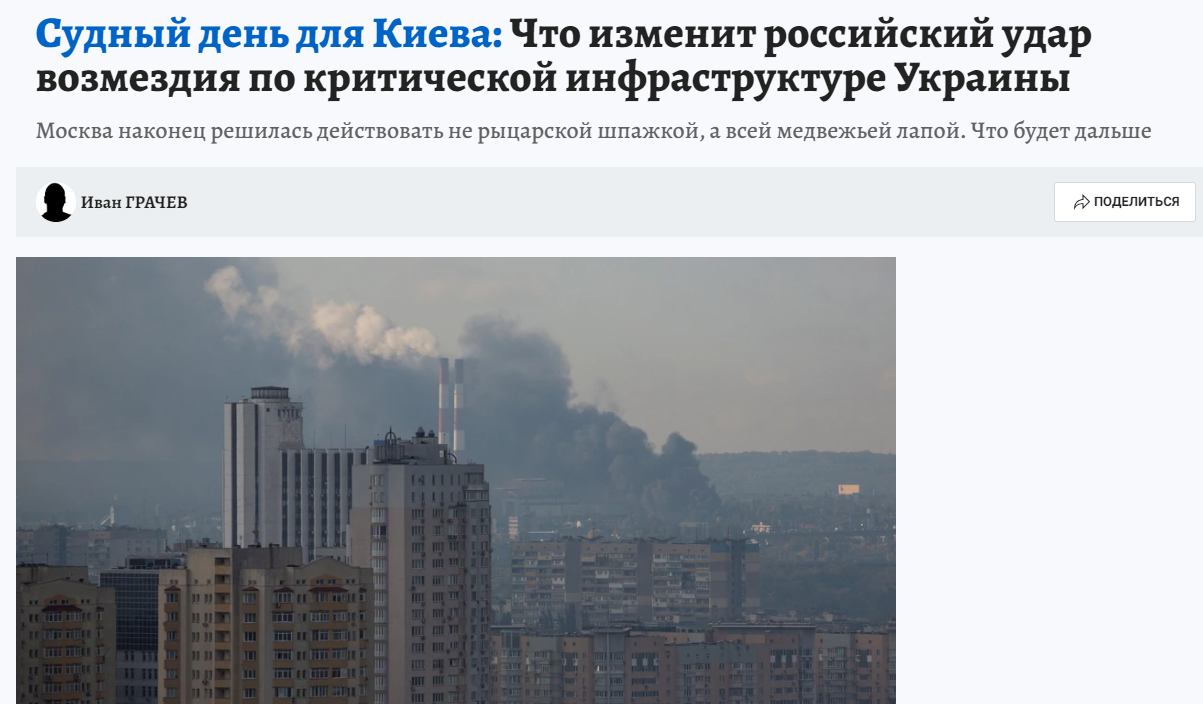
Headline: “Doomsday for Kyiv: what the Russian revenge strike on Ukraine’s critical infrastructure will change”
In the material “Explosions in Kyiv and across Ukraine: Chronicle of the October 10, 2022 revenge” he writes that “decision-making centers have been hit.”
“In Kyiv’s Shevchenkivsky district, the headquarters of the Security Service of Ukraine (SBU), whose leadership is responsible for blowing up the Crimean Bridge, has been hit. Explosion near St. Volodymyrska, where Zelensky’s office is located. Fire at the Kyiv thermal power station”.
RIA Novosti
The website reports: “Senator approves striking the critical infrastructure of Ukraine.”
The senator in question is Viktor Bondarev; the news outlet quotes his statement: “Inflicting massive precise strikes on the enemy’s critical infrastructure will bring about a quicker end of the special military operation and will save many lives. This is a step that Russia was forced to take, desperate to appeal to the Ukrainian leadership’s reason.”
Moreover, the website published articles that built on opinions from so-called “experts”. In one of them, the “National Defense” magazine editor-in-chief, Igor Korotchenko, talks about the features of the October 10 mass strike on Ukraine, and admits that “today’s attack on Ukrainian infrastructure was probably the most massive case of the Russian Air Force using long-range aviation in the entire course of the SMO.”
In the second article, Stanislav Mitrachovich, a researcher at the Russian government’s Finance University, approves of the missile attacks on Ukraine’s power supply facilities, as he believes that several weeks of such strikes will reduce Ukraine’s combat capabilities. “The more strikes on the power supply infrastructure, the less will be the Ukrainian army’s theoretical capacity for war,” says the “expert”, quoted by the publication.
RT
The newspaper posted an article titled “Forced Retaliation” by Evgeny Poddubny, the head of the VGTRK’s Bureau for the Middle East and North Africa, who is approving of the mass missile strikes on Ukraine and declares that he “sides with Putin” in this matter. According to the author’s logic, such attacks “spare the lives of Ukraine’s residents,” “residents of the largest Ukrainian cities are currently left with no electricity and water because of Zelensky.” “To eliminate the threat to Russia and liberate Ukraine, the Kyiv regime must be brought down,” Poddubny claims in the article.
In the article “Response for Terrorism Delivered”, the author, associate professor at the political science department of the Russian government’s Finance University Gevorg Mirzayan, claims that “Russians have been waiting for such a morning for many months.” According to him, “the strike was not a haphazard revenge for, say, the bridge, but a carefully prepared extermination of key Ukrainian objects.” At the same time, he notes that “multiple cities have been cut off from electricity.” “Most likely, this strikke will be followed by new ones. Russia has made a political decision to start destroying Ukrainian infrastructure (winter is coming),” Mirzoyan writes. He finishes his article with the phrase: “Basically, this is the only correct decision.”
“Vesti.ru”
The online edition relays the content of one of the “Evening with Vladimir Soloviev” programs. There, Russian political scientist Sergey Mikheev reflects on how depriving the civilian population of Ukraine will bring Russia’s victory in the war closer. He claims that striking Ukraine’s energy infrastructure should become a “daily practice” and that “the priority should be to destroy the critical infrastructure that ensures the Ukrainian state’s ability to resist.”
Mikheev makes the following statements to justify this necessity:
“Depriving them of the sense of security and satiety is a more important task than, say, destroying however many tanks there are”;
“As soon as Ukrainians find themselves without gas, electricity, water and plumbing, the mood in that country will start changing rapidly”;
“This should have been done back in March and April… If Ukrainians don’t freeze, they won’t realize what war is”;
“At first they fled to Poland, then came back to Lviv, and from there to Kyiv, and started roaming around there… Tell me, why shouldn’t we strike them?”
“Lenta.ru”
Propagandists relay the words of Russian State Duma deputy Alexei Chepa, who claims that on October 10, 2022, the mass missile strike hit “the decision-making centers” and was a retaliation for the explosion on the Crimean Bridge.
“If such miscalculations, such mistakes are made, someone should probably answer for it. Some action should be taken in response,” says, Chepa explaining his logic.
Another publication quotes statements by State Duma deputy of Yuriy Shvitkin, who said that Ukraine’s civilian power supply facilities of Ukraine were shelled simply out of vengeance:
“Undoubtedly, the attack on the Crimean bridge was the impetus for today’s attack. Critical infrastructure facilities have been hit.”
The publication devoted another article to deliberations on how to completely de-energize Ukraine. Igor Yushkov, analyst at the National Energy Security Fund of Russia, reflects on this matter. In order to completely deprive Ukraine of electricity, he proposes to carry out systematic mass strikes on the power supply facilities.
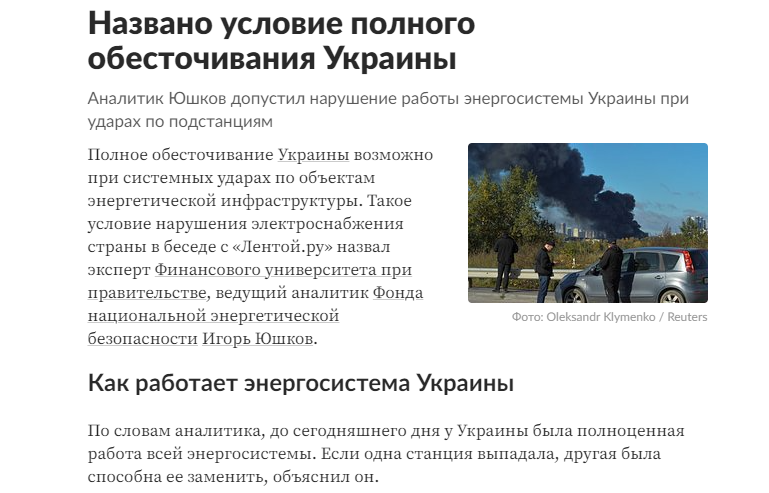
Headline: “Expert names the condition for a full blackout in Ukraine”
“Systematic destruction is needed to break the railway connection, to leave the country without electricity,” Yushkov is quoted as saying by Lenta.ru.
“Izvestia”
“Any modern civilization relies on electricity and communication systems, reminds military expert Alexei Leonkov,” writes “Izvestia”, and adds another quote from the expert: “It was primarily such infrastructure that was targeted.”
“In case such strikes continue, the Kyiv regime will have to spend more effort to maintain the welfare of the people, industry, and transport,” the hero of the material adds.
“Yesterday, the people of Ukraine rejoiced, influenced by their propaganda, away from the combat areas. Now it’s over. The regime will have to explain to the people what happened to the country’s infrastructure suddenly,” Leonkov says, sharing his hopes.
In another article, the publication quotes a comment by the former deputy head of the Russian Foreign Ministry Sergey Ordzhonikidze, who, unimaginatively, accuses Ukraine of terrorism and calls for exterminating it.
“Since they do not comply with the international law, the humanitarian laws, the laws of human decency, there is nothing to talk to them about, only extermination, that’s it,” Ordzhonikidze is quoted as saying by “Izvestia”.
“Meduza”
This media outlet published a compilation of photos showing the aftermath of the missile strikes on Ukrainian cities under the following headline:
“Russia drops dozens of missiles on Ukrainian cities. Putin declares that it was a ‘massive high-precision strike.’ Take a look at the places those ‘high-precision’ strikes targeted”.
In the caption to the photo compilation, the publication reports that according to the Ukrainian police, 10 people were killed by the shelling and about 60 were wounded.
Meduza also had a podcast episode, titled:
“Russian troops bomb a business center, a park, residential buildings and public transport stops in Ukraine. The Russian Ministry of Defense claims that ‘the strikes hit military command, communication, and power supply facilities.'”
The description of the episode mentions 14 killed and 100 wounded by the mass missile attack on Ukraine. It also mentions that, according to Vladimir Putin, the shelling was “a retaliation for the Crimean Bridge bombing,” and that Kyiv has not officially admitted responsibility for this explosion. The description also quotes Volodymyr Zelensky’s words: “We are dealing with terrorists.”
“Novaya Gazeta. Europe”
The website has published an article titled “General Surovikin’s last barrage. Why the cruise missile attack on Kyiv has brought Putin’s defeat in the war closer.”
The article states, among other things, that, according to international law, the Crimean Bridge is a legitimate military target for Ukraine to hit, as it was built on annexed territory and is being used to supply the Russian military units in Kherson. It also mentions that Russia’s war against Ukraine is terroristic, and that a mass missile attack on civilian infrastructure in response to the bridge sabotage can be assessed as an irrational criminal act that has no chance of achieving the goal of intimidating Ukrainians and breaking their morale, but will only lead to an increase in the international support for Ukraine. At the same time, the text says that the responsibility for the mass shelling lies only on General Sergey Surovikin. There is no mention of the Russian society’s responsibility in this article.
Another material is titled “The missile war for the Russian throne has begun. How Surovikin’s new post is related to the strikes on Kyiv.”
The article calls the mass attack Putin’s “missile terror” which is a reaction to Russia’s front line failures a consequence of Sergey Surovikin being appointed as the commander of Russian forces in Ukraine, and describes the general’s tactics as “military-terrorist.”
In general, the article suggests that General Surovikin’s appointment was announced publicly to shift the responsibility for the assessed loss in the war against Ukraine to him.
October 17
On this day, Russian propagandists were paying significantly less attention to the mass attack on Ukraine. In the world of Russian propaganda, Iranian drones are called “Geran” UAVs. The news feeds only occasionaly reported “air raid alerts” and “explosions” in Ukrainian cities, stressing the damage to power supply facilities, and there were no mentions of a missile hitting a residential house in downtown Kyiv, destroying it completely.
Still, none of the studied Russian propaganda resources failed to cover yet another report from the Russian Ministry of Defense which mentioned “high-precision strikes” on “military command and energy system facilities,” followed by the already traditional “all targeted objects were hit”.
Only a few publications among those surveyed published additional, unofficial triumphant assessments about the attack and calls for more.
“Komsomolskaya Pravda” reported on the Defense Ministry’s victorious report and added a background note which states: “According to Ukrainian Telegram channels, a Geran UAV blew up an Ukrenergo building in Kyiv; some also say that as Gerans were flying by majestically, ‘even individual Banderites were trying to shoot them down from the windows of high-rise buildings.'”
TASS and Lenta.ru cite the “LPR” representative in Moscow, Rodion Miroshnik, who is convinced that the reason for President Zelensky’s calls on Ukrainians to save up electricity is his desire to save up money for the army’s needs.
“For electric locomotives to pull trains carrying military equipment, for the Internet and special communications to receive intelligence from the West were functional. And people? People are only needed for mobilization,” says Miroshnik.
RIA Novosti quotes the same figure, who now declares that “there are no air defense systems in Kyiv” and claims that “the drones hit wherever we aimed them.”
“Izvestia” also insists on “Ukraine’s Air Defense Forces being unable to withstand the Russian drones and missiles.” Russian military expert Viktor Litovkin spoke with the publication about this. He also assures that the strikes only target the objects that “affect the armed forces’ combat capabilities,” but, as he lists such objects, he mentions the Kyiv railway station and thermal power plants.
“Moskovsky Komsomolets” was the most prolific in propaganda that day and offered its audience an article titled “‘Ukraine must be driven into the Stone Age:’ expert speaks about the destroyed infrastructure”. Here, an expert from the Military and Political Research Center at the Moscow State Military Academy, Mikhail Aleksandrov, suggests stepping up the intensity of strikes on Ukrainian cities.
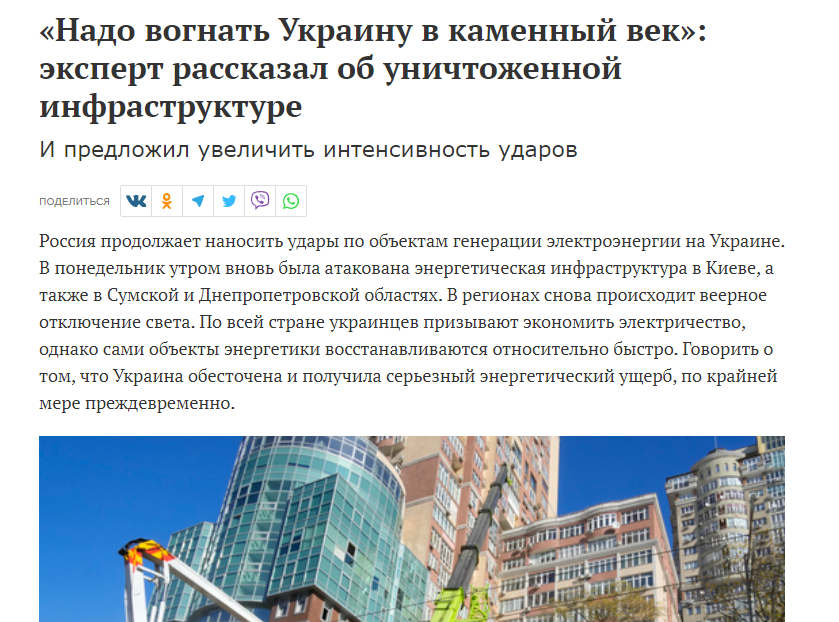
Headline: “‘Ukraine must be driven into the Stone Age:’ expert speaks about the destroyed infrastructure”. Subtitle: “And proposes to step up the intensity of the strikes”.
“I believe that these strikes are certainly insufficient,” he declares.
“Zelensky is not going to capitulate until we bomb Ukraine into the Stone Age,” Aleksandrov is convinced.
“We can strike these substations with 3-ton bombs, so that there is nothing left at all and nothing to repair,” the expert raves.
In another article (“A ‘certain pattern’ observed in Russia’s strikes. ‘They strike carefully'”), military expert Alexei Leonkov says that the mass attacks on Ukraine are “premeditated”, because their algorithm allows “to destroy the sensitive power supply system” and “they won’t be able to do repairs endlessly”, so the strikes will continue “until the desired result is achieved.”
In the article “Political scientist speaks about Kyiv’s inability to defend itself against Moscow’s missile attacks”, political scientist Ivan Konovalov notes that since there are many energy facilities in Ukraine, attacks on them will have to be carried out over a period of time, but “by the time winter starts for real, the results will already be noticeable.”
At the same time, political scientist Rostislav Ishchenko laments that drones cannot be a full substitute for cruise missiles, but notes that they are nevertheless comparable in terms of the scale of the damage they cause. He adds that if such a drone “hits a locomotive, it will go down, and then the cars will do the rest themselves: people maimed, equipment destroyed.” “Moskovsky Komsomolets” titled this article “Expert says that Russia has enough drones and missiles in Ukraine.”
October 31
All the studied publications, except for “Meduza” and “Novaya Gazeta. Europe”, share Putin’s admission that the missile strikes on Ukraine’s peaceful cities were carried out in response to drone attacks on the Russian Black Sea Fleet, which is based on Ukrainian territory – in Russian-annexed Crimea. “Partly so, but it’s not all we could do,” the Russian president said when asked if the missile strikes on Ukraine had to do with the events in Sevastopol two days before. The pro-Kremlin propagandists immortalized this quote. TASS used the phrasing “Putin admits” in their headline to the relevant news report.
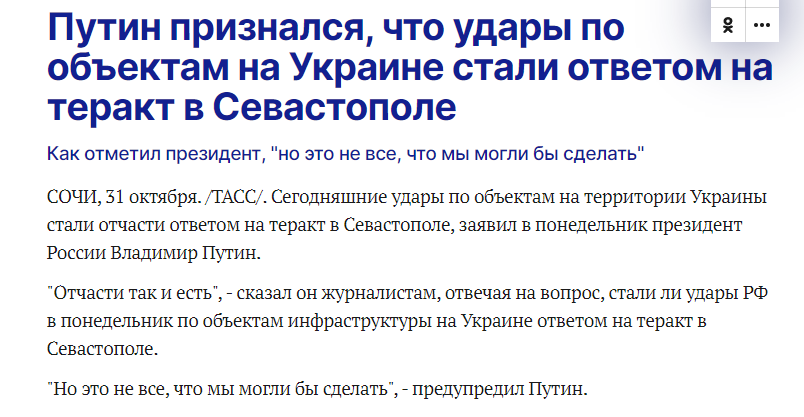
Headline: “Putin admits that the strikes on Ukrainian objects were a response to the Sevastopol terrorist attack”. Subtitle: “As the President notes, “it’s not all we could do.”
Russian propaganda resources also traditionally unanimously relay the Russian Ministry of Defense report saying that “the Armed Forces of the Russian Federation hit all the designated military command and power supply facilities of Ukraine with high-precision long-range weapons.”
A news item by “Komsomolskaya Pravda” stands out among this series of monotonous reports. It is notable for mentioning the name of the correspondent who wrote it – Aleksandr Boyko. The newspaper’s employee, like the rest of his colleagues, has a profile with a photo on their website. The photo shows a man in a military uniform with a machine gun in his hands. Whether this is really the person who calls himself a journalist, or whether it is a portrait of some idol of his, remains unknown.

Websites studied:
RIA Novosti (editor-in-chief Andrey Gavrilov. Website traffic on October 10, 2022 – 8,444,389 visits; October 17 – 5,439,139 visits; October 31 – 4,663,343 visits);
“Komsomolskaya Pravda” (editor-in-chief Vladimir Sungorkin. Website traffic on October 10, 2022 – 6,782,248 visits; October 17 – 5,034,519 visits; October 31 – 5,527,540 visits);
“Lenta.ru” (editor-in-chief Vladimir Todorov. Website traffic on October 10, 2022 – 5,859,704 visits; October 17 – 4,405,632 visits; October 31 – 4,197,383 visits);
RT (the website’s editor-in-chief is not specified. The media holding’s CEO is Dmitry Kiselyov. Website traffic on October 10, 2022 – 3,969,157 visits; October 17 – 2,873,727 visits; October 31 – 3,086,556 visits);
“Moskovsky Komsomolets” (editor-in-chief Pavel Gusev. Website traffic on October 10, 2022 – 3,341,078 visits; October 17 – 2,267,119 visits; October 31 – 2,654,990 visits);
“Gazeta.ru” (editor-in-chief Sergei Rybka. Website traffic on October 10, 2022 – 3,969,157 visits; October 17 – 2,837,727 visits; October 31 – 3,086,556 visits);
TASS (editor-in-chief Mikhail Petrov. Website traffic on October 10, 2022 – 1,621,835 visits; October 17 – 1,381,147 visits; October 31 – 1,094,834 visits);
“Rossiyskaya gazeta” (editor-in-chief Vladistav Fronin. Website traffic on October 10, 2022 – 1,776,519 visits; October 17 – 1,227,156 visits; October 31 – 1,289,867 visits);
“Vesti.ru” (editor-in-chief Nikolai Yenikolov. Website traffic data is private);
“Izvestia” (editor-in-chief Sergey Koroteev. Website traffic data is private);
“Novaya Gazeta. Europe” (editor-in-chief Kiril Martynov);
“Meduza” (editor-in-chief Ivan Kolpakov).

